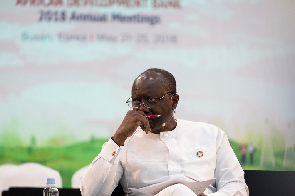For the country’s economy to surmount the various challenges brought upon it by the coronavirus pandemic, managers of the economy must take bold tax measures to reform the tax system – which should include bringing back some of the taxes previously scrapped by government, policy think-tank Oxfam has said.
The Oxfam report, authored by Dr. Alex Ampaabeng, says in view of the ravages caused by coronavirus on economies around the world – which will widen Ghana’s overall fiscal deficit to GH¢30.2billion, representing 7.8 percent of revised GDP, from a previous pre-coronavirus target of GH¢18.9billion (4.7% of GDP) – it will be important for managers of the economy to adopt drastic measures which may be unpopular with the masses but yield the country some revenue to close the gaping fiscal gap.
Some of the measures Oxfam proposes include introduction of an additional tax band on higher incomes; removing personal reliefs on higher income earners; re-introduction of fair luxury vehicle levies; implementation of a digitised property taxation system; and review and amendment of generous tax exemptions.
Other measures it proffers include implementing effective taxation of high net worth individuals; improving tax communication; implementing a robust ICT-led administrative system; and involving non-conventional partners, such as faith-based organisations.
On income tax, Oxfam says personal allowances that are enjoyed by every tax payer – such as married couples’ allowance, child education support, dependent spouse, etc. – should be abolished for high income earners, as their main purpose is to reduce inequality. Removing such tax freebies for higher income tax earners – such as those earning over GH¢20,000 a month, the report says, could generate substantial revenue while promoting one of the core aims of taxation, which is fairness.
Another tax that the think-tank proposed be re-introduced is the luxury vehicle levy, which was scrapped after a year of its introduction as government couldn’t realise the projected revenue from it. But Oxfam says the tax failed due to its poor implementation, and hence it should be brought back – but must capture the real luxury vehicles and not use Co2 emission rates as the basis. For example, it says, the monetary value of a vehicle should be used to determine its luxuriousness and taxes must be reviewed downward as the vehicles grow old.
The Oxfam report further waded into the tax exemptions saga that is draining the economy of needed revenue. Tax exemption is estimated to have cost the country more than US$1.1billion in 2018; equivalent to 1.6 percent of GDP. It is against this backdrop that the think-tank says a review of the exemptions will directly increase revenue urgently required in this pandemic period.
It adds that the exemptions must be reviewed to ensure that key sectors likely to drive the economy are supported, and not powerful corporations. Hence, government can consider temporary liquidity-enhancing measures such as deferring tax payment to support business’ cash flows.
Another suggestion it made to government is introducing efficiency in the tax administration system by use of technology. This, it said, will block leakages that stem from corruption, under-reporting and under-collection, which are costing the economy substantial revenue each year.
“Government needs to recognise the impact of technology in promoting compliance. Information and communications technology are increasingly playing a critical role in tax compliance management. The use of ICT, especially in the hard-to-tax sectors, is crucial as it could promote detection and compliance through automatic gathering of third-party information as a by-product of natural business processes. Again, ICT systems reduce compliance costs and enhance data capturing for effective tax policy design,” it said.
The Oxfam report however advised government to build political consensus with stakeholders before implementing policies which have the ability to incur the displeasure of citizens and investors alike; adding that any move to score political points with these policies should be avoided.
Click to view details



Business News of Wednesday, 17 June 2020
Source: thebftonline.com

















